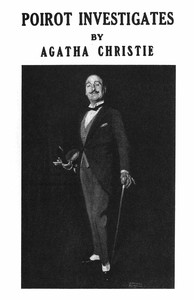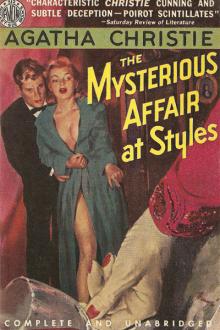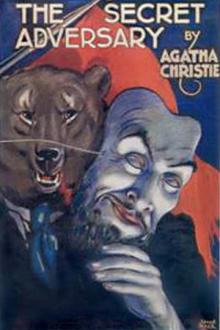Poirot Investigates by Agatha Christie (10 ebook reader .TXT) 📗

- Author: Agatha Christie
Book online «Poirot Investigates by Agatha Christie (10 ebook reader .TXT) 📗». Author Agatha Christie
As Poirot still seemed sunk in a daydream, I took a sheet of paper, and amused myself by scribbling notes upon it. My friend’s voice aroused me. He had come out of his reverie, and was looking brisk and alert.
“Que faites vous là, mon ami?”
“I was jotting down what occurred to me as the main points of interest in this affair.”
“You become methodical—at last!” said Poirot approvingly.
I concealed my pleasure. “Shall I read them to you?”
“By all means.”
I cleared my throat.
“‘One: All the evidence points to Lowen having been the man who forced the safe.
“‘Two: He had a grudge against Davenheim.
“‘Three: He lied in his first statement that he had never left the study.
“‘Four: If you accept Billy Kellett’s story as true, Lowen is unmistakably implicated.’”
I paused. “Well?” I asked, for I felt that I had put my finger on all the vital facts.
Poirot looked at me pityingly, shaking his head very gently. “Mon pauvre ami! But it is that you have not the gift! The important detail, you appreciate him never! Also, your reasoning is false.”
“How?”
“Let me take your four points.
“One: Mr. Lowen could not possibly know that he would have the chance to open the safe. He came for a business interview. He could not know beforehand that Mr. Davenheim would be absent posting a letter, and that he would consequently be alone in the study!”
“He might have seized his opportunity,” I suggested.
“And the tools? City gentlemen do not carry round housebreaker’s tools on the off chance! And one could not cut into that safe with a penknife, bien entendu!”
“Well, what about Number Two?”
“You say Lowen had a grudge against Mr. Davenheim. What you mean is that he had once or twice got the better of him. And presumably those transactions were entered into with the view of benefiting himself. In any case you do not as a rule bear a grudge against a man you have got the better of—it is more likely to be the other way about. Whatever grudge there might have been would have been on Mr. Davenheim’s side.”
“Well, you can’t deny that he lied about never having left the study?”
“No. But he may have been frightened. Remember, the missing man’s clothes had just been discovered in the lake. Of course, as usual, he would have done better to speak the truth.”
“And the fourth point?”
“I grant you that. If Kellett’s story is true, Lowen is undeniably implicated. That is what makes the affair so very interesting.”
“Then I did appreciate one vital fact?”
“Perhaps—but you have entirely overlooked the two most important points, the ones which undoubtedly hold the clue to the whole matter.”
“And pray, what are they?”
“One, the passion which has grown upon Mr. Davenheim in the last few years for buying jewellery. Two, his trip to Buenos Ayres last autumn.”
“Poirot, you are joking!”
“I am most serious. Ah, sacred thunder, but I hope Japp will not forget my little commission.”
But the detective, entering into the spirit of the joke, had remembered it so well that a telegram was handed to Poirot about eleven o’clock the next day. At his request I opened it and read it out:
“‘Husband and wife have occupied separate rooms since last winter.’”
“Aha!” cried Poirot. “And now we are in mid June! All is solved!”
I stared at him.
“You have no moneys in the bank of Davenheim and Salmon, mon ami?”
“No,” I said, wondering. “Why?”
“Because I should advise you to withdraw it—before it is too late.”
“Why, what do you expect?”
“I expect a big smash in a few days—perhaps sooner. Which reminds me, we will return the compliment of a dépêche to Japp. A pencil, I pray you, and a form. Voilà! ‘Advise you to withdraw any money deposited with firm in question.’ That will intrigue him, the good Japp! His eyes will open wide—wide! He will not comprehend in the slightest—until to-morrow, or the next day!”
I remained sceptical, but the morrow forced me to render tribute to my friend’s remarkable powers. In every paper was a huge headline telling of the sensational failure of the Davenheim bank. The disappearance of the famous financier took on a totally different aspect in the light of the revelation of the financial affairs of the bank.
Before we were half-way through breakfast, the door flew open and Japp rushed in. In his left hand was a paper; in his right was Poirot’s telegram, which he banged down on the table in front of my friend.
“How did you know, Monsieur Poirot? How the blazes could you know?”
Poirot smiled placidly at him. “Ah, mon ami, after your wire, it was a certainty! From the commencement, see you, it struck me that the safe burglary was somewhat remarkable. Jewels, ready money, bearer bonds—all so conveniently arranged for—whom? Well, the good Monsieur Davenheim was of those who ‘look after Number One’ as your saying goes! It seemed almost certain that it was arranged for—himself! Then his passion of late years for buying jewellery! How simple! The funds he embezzled, he converted into jewels, very likely replacing them in turn with paste duplicates, and so he put away in a safe place, under another name, a considerable fortune to be enjoyed all in good time when every one has been thrown off the track. His arrangements completed, he makes an appointment with Mr. Lowen (who has been imprudent enough in the past to cross the great man once or twice), drills a hole in the safe, leaves orders that the guest is to be shown into the study, and walks out of the house—where?” Poirot stopped, and stretched out his hand for another boiled egg. He frowned. “It is really insupportable,” he murmured, “that every hen lays an egg of a different size! What symmetry can there be on the breakfast table? At least they should sort them in dozens at the shop!”
“Never mind the eggs,” said Japp impatiently. “Let ’em lay ’em square if they like. Tell us where our customer went to when he left The Cedars—that is, if you know!”
“Eh bien, he went to his hiding-place. Ah, this Monsieur Davenheim, there may be some malformation in his grey cells, but they are of the first quality!”
“Do you know where he is hiding?”
“Certainly! It is most ingenious.”
“For the Lord’s sake, tell us, then!”
Poirot gently collected every fragment of shell from his plate, placed them in the egg-cup, and reversed the empty egg-shell on top of them. This little operation concluded, he smiled on the neat effect, and then beamed affectionately on us both.
“Come, my friends, you are men of intelligence. Ask yourselves the question which I asked myself. ‘If I were this man, where should I hide?’ Hastings, what do you say?”
“Well,” I said, “I’m rather inclined to think I’d not do a bolt at all. I’d stay in London—in the heart of things, travel by tubes and buses; ten to one I’d never be recognized. There’s safety in a crowd.”
Poirot turned inquiringly to Japp.
“I don’t agree. Get clear away at once—that’s the only chance. I would have had plenty of time to prepare things beforehand. I’d have a yacht waiting, with steam up, and I’d be off to one of the most out-of-the-way corners of the world before the hue and cry began!”
We both looked at Poirot. “What do you say, monsieur?”
For a moment he remained silent. Then a very curious smile flitted across his face.
“My friends, if I were hiding from the police, do you know where I should hide? In a prison!”
“What?”
“You are seeking Monsieur Davenheim in order to put him in prison, so you never dream of looking to see if he may not be already there!”
“What do you mean?”
“You tell me Madame Davenheim is not a very intelligent woman. Nevertheless I think that if you took her to Bow Street and confronted her with the man Billy Kellett, she would recognize him! In spite of the fact that he has shaved his beard and moustache and those bushy eyebrows, and has cropped his hair close. A woman nearly always knows her husband, though the rest of the world may be deceived!”
“Billy Kellett? But he’s known to the police!”
“Did I not tell you Davenheim was a clever man? He prepared his alibi long beforehand. He was not in Buenos Ayres last autumn—he was creating the character of Billy Kellett, ‘doing three months,’ so that the police should have no suspicions when the time came. He was playing, remember, for a large fortune, as well as liberty. It was worth while doing the thing thoroughly. Only——”
“Yes?”
“Eh bien, afterwards he had to wear a false beard and wig, had to make up as himself again, and to sleep with a false beard is not easy—it invites detection! He cannot risk continuing to share the chamber of madame his wife. You found out for me that for the last six months, or ever since his supposed return from Buenos Ayres, he and Mrs. Davenheim occupied separate rooms. Then I was sure! Everything fitted in. The gardener who fancied he saw his master going round to the side of the house was quite right. He went to the boathouse, donned his ‘tramp’ clothes, which you may be sure had been safely hidden from the eyes of his valet, dropped the others in the lake, and proceeded to carry out his plan by pawning the ring in an obvious manner, and then assaulting a policeman, getting himself safely into the haven of Bow Street, where nobody would ever dream of looking for him!”
“It’s impossible,” murmured Japp.
“Ask Madame,” said my friend, smiling.
The next day a registered letter lay beside Poirot’s plate. He opened it, and a five-pound note fluttered out. My friend’s brow puckered.
“Ah, sacré! But what shall I do with it? I have much remorse! Ce pauvre Japp! Ah, an idea! We will have a little dinner, we three! That consoles me. It was really too easy. I am ashamed. I, who would not rob a child—mille tonnerres! Mon ami, what have you, that you laugh so heartily?”
XPoirot and I had many friends and acquaintances of an informal nature. Amongst these was to be numbered Dr. Hawker, a near neighbour of ours, and a member of the medical profession. It was the genial doctor’s habit to drop in sometimes of an evening and have a chat with Poirot, of whose genius he was an ardent admirer. The doctor himself, frank and unsuspicious to the last degree, admired the talents so far removed from his own.
On one particular evening in early June, he arrived about half-past eight and settled down to a comfortable discussion on the cheery topic of the prevalence of arsenical poisoning in crimes. It must have been about a quarter of an hour later when the door of our sitting-room flew open, and a distracted female precipitated herself into the room.
“Oh, doctor, you’re wanted! Such a terrible voice. It gave me a turn, it did indeed.”
I recognized in our new visitor Dr. Hawker’s housekeeper, Miss Rider. The doctor was a bachelor, and lived in a gloomy old house a few streets away. The usually placid Miss Rider was now in a state bordering on incoherence.
“What terrible voice? Who is it, and what’s the trouble?”
“It was the telephone, doctor. I answered it—and a voice spoke. ‘Help,’ it said. ‘Doctor—help. They’ve killed me!’ Then it sort of tailed away. ‘Who’s speaking?’ I said. ‘Who’s speaking?’ Then I got a reply, just a whisper, it seemed, ‘Foscatine’—something like that—‘Regent’s Court.’”
The doctor uttered an exclamation.
“Count Foscatini. He has a flat in Regent’s Court. I must go at once. What can have happened?”
“A patient of yours?” asked Poirot.
“I attended him for some slight ailment a few weeks ago. An Italian, but he speaks English perfectly. Well, I must wish you good night, Monsieur Poirot, unless——” He hesitated.
“I perceive the thought in your mind,” said Poirot, smiling. “I shall be delighted to accompany you. Hastings, run down and get hold of a taxi.”
Taxis always make themselves sought for when one is particularly pressed for time, but I captured one at last, and we were soon bowling along in the direction of Regent’s Park. Regent’s Court was a new block of flats, situated just off St. John’s Wood Road. They had only recently been built, and contained the latest service devices.
There was no one in the hall. The doctor pressed the lift-bell impatiently, and when the lift arrived questioned the uniformed attendant sharply.
“Flat ii. Count Foscatini. There’s been an accident there, I understand.”
The man stared at him.
“First I’ve heard of it. Mr. Graves—that’s Count Foscatini’s man—went out about half an hour ago, and he said nothing.”
“Is the Count alone in the flat?”
“No, sir, he’s got two gentlemen dining with him.”
“What are they like?” I asked eagerly.
We were in the lift now, ascending rapidly to the second floor, on which Flat ii was situated.
“I didn’t see them myself, sir, but I understand that they were foreign gentlemen.”
He pulled back the iron door, and we stepped out on the landing. No. ii was opposite to us. The doctor rang the bell. There was no reply, and we could hear no sound from within. The doctor rang again and again; we could hear the bell trilling within, but no sign of life rewarded us.
“This is getting serious,” muttered the doctor. He turned to the lift attendant.
“Is there any





Comments (0)